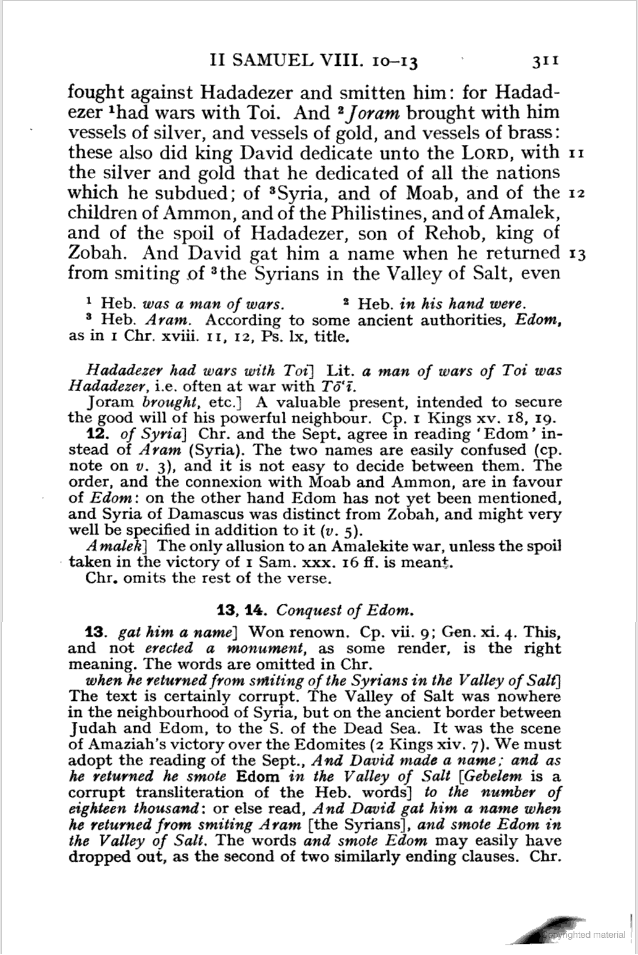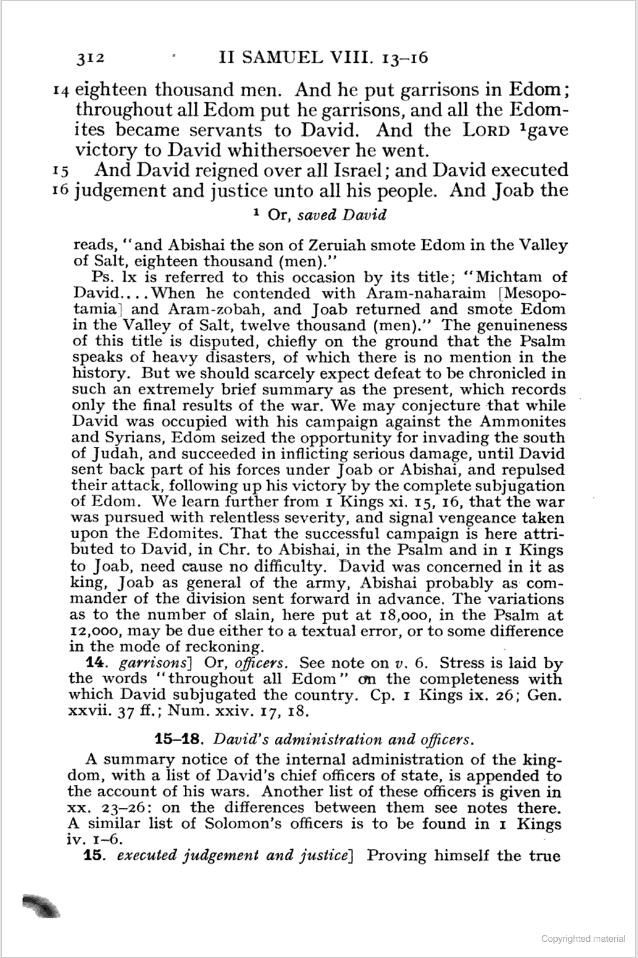The Cambridge Bible for Schools and Colleges on the words Edom and Aram in II Samuel Chapter 8
The following text is reproduced from pages 311-312 of The Cambridge Bible for Schools and Colleges. The Second Book of Samuel. A limited version of this book may be viewed freely at Google Books. Below we shall provide facsimiles to the pages to which we refer. The pages present II Samuel chapter 8, verses 10 through 16, and have copious notes offering notes concerning the translation. Here we are interested in the notes for verses 12 and 13, which explain the common confusion of the words Aram, or Aramaean, and Edom, or Edomite, which are very similar in Hebrew. Aram is usually translated as Syria in the King James and other versions, while Aramaean is usually Syrian.
| II SAMUEL VIII. 10-13 | 311 |
| fought against Hadadezer and smitten him: for Hadadezer1 had wars with Toi. And 2Joram brought with him vessels of silver, and vessels of gold, and vessels of brass: these also did king David dedicate unto the Lord, with the silver and gold that he dedicated of all the nations which he subdued; of 3Syria, and of Moab, and of the children of Ammon, and of the Philistines, and of Amalek, and of the spoil of Hadadezer, son of Rehob, king of Zobah. And David gat him a name when he returned from smiting of 3the Syrians in the Valley of Salt, even | 11 12 13 |
1 Heb. was a man of wars. 2 Heb. in his hand were.
3 Heb. Aram. According to some ancient authorities, Edom, as in I Chr. Xviii. 11, 12, Ps. lx. title.
Hadadezer had wars with Toi] Lit. a man of wars of Toi was Hadadezer, i.e. often at war with Tō'ī.
Joram brought, etc.] A valuable present, intended to secure the good will of his powerful neighbour. Cp. I Kings xv. 18, 19.
12. of Syria] Chr. and the Sept. agree in reading ‘Edom’ instead of Aram (Syria). The two names are easily confused (cp. note on v. 3), and it is not easy to decide between them. The order, and the connexion with Moab and Ammon are in favour of Edom: on the other hand Edom has not yet been, mentioned, and Syria of Damascus was distinct from Zobah, and might very well be specified in addition to it (v. 5).
Amalek] The only allusion to an Amalekite war, unless the spoil taken in the victory of I Sam. xxx. 16 ff. is meant.
Chr. omits the rest of the verse.
13,14. Conquest of Edom.
13. gat him a name Won renown. Cp. Vii. 9; Gen. xi. 4. This, and not erected a monument, as some render, is the right meaning. The words are omitted in Chr.
when he returned from smiting of the Syrians in the Valley of Salt] The text is certainly corrupt. The Valley of Salt was nowhere in the neighbourhood of Syria, but on the ancient border between Judah and Edom, to the S. of the Dead Sea. It was the scene of Amaziah's victory over the Edomites (2 Kings xiv. 7). We must adopt the reading of the Sept., And David made a name: and as he returned he smote Edom in the Valley of Salt [Gebelem is a corrupt transliteration of the Heb. words] to the number of eighteen thousand: or else read, And David gat him a name when he returned from smiting Aram [the Syrians], and smote Edom in the Valley of Salt. The words and smote Edom may easily have dropped out, as the second of two similarly ending clauses. Chr.
The notes to verses 13 and 14 carry over to page 312 of our original book, so that page will also be reproduced here:
312 | II SAMUEL VIII. 13-16 |
|
| 14 | eighteen thousand men. And he put garrisons in Edom; throughout all Edom put he garrisons, and all the Edomites became servants to David. And the Lord 1gave victory to David whithersoever he went. |
15 16 | And David reigned over all Israel; and David executed judgement and justice unto all his people. And Joab the |
1 Or, saved David
reads, “and Abishai the son of Zeruiah smote Edom in the Valley of Salt, eighteen thousand (men).”
Ps. lx is referred to this occasion by its title; “Michtam of David.… When he contended with Aram-naharaim [Mesopotamia] and Aram-zobah, and Joab returned and smote Edom in the Valley of Salt, twelve thousand (men).” The genuineness of this title is disputed, chiefly on the ground that the Psalm speaks of heavy disasters, of which there is no mention in the history. But we should scarcely expect defeat to be chronicled in such an extremely brief summary as the present, which records only the final results of the war. We may conjecture that while David was occupied with his campaign against the Ammonites and Syrians, Edom seized the opportunity for invading the south of Judah, and succeeded in inflicting serious damage, until David sent back part of his forces under Joab or Abishai, and repulsed their attack, following up his victory by the complete subjugation of Edom. We learn further from I Kings xi. 15, 16, that the war was pursued with relentless severity, and signal vengeance taken upon the Edomites. That the successful campaign is here attributed to David, in Chr. to Abishai, in the Psalm and in 1 Kings to Joab, need cause no difficulty. David was concerned in it as king, Joab as general of the army, Abishai probably as commander of the division sent forward in advance. The variations as to the number of slain, here put at 18,000, in the Psalm at 12,000, may be due either to a textual error, or to some difference in the mode of reckoning.
14. garrisons] Or, officers. See note on v. 6. Stress is laid by the words “throughout all Edom” on the completeness with which David subjugated the country. Cp. I Kings ix. 26; Gen. xxvii. 37 ff.; Num. xxiv. 17, 18.
15-18. David's administration and officers.
A summary notice of the internal administration of the kingdom, with a list of David's chief officers of state, is appended to the account of his wars. Another list of these officers is given in xx. 23-26: on the differences between them see notes there. A similar list of Solomon's officers is to be hand in I Kings iv. 1-6.
15. executed judgement and justice] Proving himself the true ….








